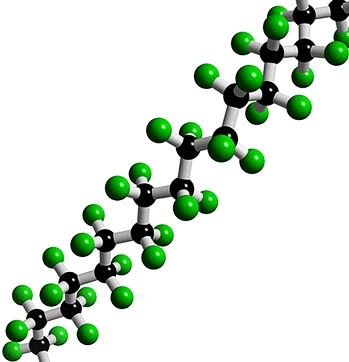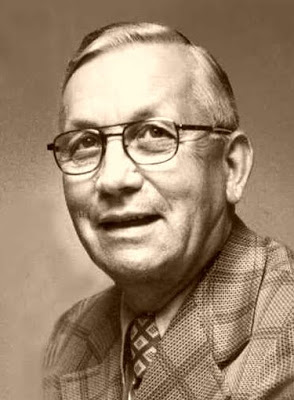Philosophy

 Roy J. Plunkett
Roy J. Plunkett
26 June 26th, 1910 to May 12th, 1994
Roy J. Plunkett was an "American chemist and inventor of Teflon (the DuPont trademark name for Polytetrafluoroethylene or PTFE). His discovery, while working for DuPont, was accidental. On 6 Apr 1938, Plunkett found that a tank of gaseous tetrafluoroethylene (CF2CF2) had polymerized to a white powder. During WW II this new polymer was applied as a corrosion-resistant coating to protect metal equipment used in the production of radioactive material. DuPont released its trademarked Teflon coated nonstick cookware in 1960."
Frankly, I never liked Teflon coated products. I will stay with the cast iron.
Polytetrafluoroethylene [Wikipedia]
Roy J. Plunkett [Wikipedia]
- How Reliable Is Wikipedia?
The taller of the short people is working on a research project on Ruth Wakefield, the accidental inventor of the chocolate chip cookie. She's finding few resources in the public library, so we did a web search and pointing to the results, she tells...
- L’ecran Magique
"July 12, 1960: Etch a Sketch? Let Us Draw You a Picture" by Tony Long July 12th, 2010 Wired 1960: The Etch a Sketch goes on sale. The technology behind this children’s toy is both simple and complex. Simple, in that an internal stylus is used,...
- Mylar®...a Revolution In Long Chain Polymers
In 1952, Mylar® was registered as a DuPont trademark for an extraordinarily strong polyester film that grew out of the development of Dacron® in the early 1950s. During the 1960s its superior strength steadily replaced cellophane because of its its...
- "true Function Of Science" Poll
What do you think is the true function of science... Knowledge...2 Technology...0 Both...3 Other...0 Ideally, the true function of science would be the acquisition of knowledge about ourselves and the universe and in many cases that is the primary function...
- Some Culinary Science
Culinary science...simple introduction A subject near and dear to all: Cooking--the physics of food preparation. It can be done indoors and/or outdoors and for the most part involve three forms of thermodynamics: Radiation [thanks to Einstein], convection...
Philosophy
Polytetrafluoroethylene...Roy J. Plunkett

 Roy J. Plunkett
Roy J. Plunkett26 June 26th, 1910 to May 12th, 1994
Roy J. Plunkett was an "American chemist and inventor of Teflon (the DuPont trademark name for Polytetrafluoroethylene or PTFE). His discovery, while working for DuPont, was accidental. On 6 Apr 1938, Plunkett found that a tank of gaseous tetrafluoroethylene (CF2CF2) had polymerized to a white powder. During WW II this new polymer was applied as a corrosion-resistant coating to protect metal equipment used in the production of radioactive material. DuPont released its trademarked Teflon coated nonstick cookware in 1960."
Frankly, I never liked Teflon coated products. I will stay with the cast iron.
Polytetrafluoroethylene [Wikipedia]
Roy J. Plunkett [Wikipedia]
- How Reliable Is Wikipedia?
The taller of the short people is working on a research project on Ruth Wakefield, the accidental inventor of the chocolate chip cookie. She's finding few resources in the public library, so we did a web search and pointing to the results, she tells...
- L’ecran Magique
"July 12, 1960: Etch a Sketch? Let Us Draw You a Picture" by Tony Long July 12th, 2010 Wired 1960: The Etch a Sketch goes on sale. The technology behind this children’s toy is both simple and complex. Simple, in that an internal stylus is used,...
- Mylar®...a Revolution In Long Chain Polymers
In 1952, Mylar® was registered as a DuPont trademark for an extraordinarily strong polyester film that grew out of the development of Dacron® in the early 1950s. During the 1960s its superior strength steadily replaced cellophane because of its its...
- "true Function Of Science" Poll
What do you think is the true function of science... Knowledge...2 Technology...0 Both...3 Other...0 Ideally, the true function of science would be the acquisition of knowledge about ourselves and the universe and in many cases that is the primary function...
- Some Culinary Science
Culinary science...simple introduction A subject near and dear to all: Cooking--the physics of food preparation. It can be done indoors and/or outdoors and for the most part involve three forms of thermodynamics: Radiation [thanks to Einstein], convection...
